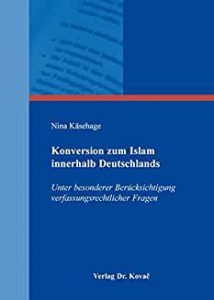(Online) Articles
“Frauen im Extremismus – Radikale Rekruteurinnen zwischen Tradition und Moderne”
Women who are involved in extremist movements are still largely ignored by researchers and the public, or portrayed in the media in a one-sided manner as “terrorist brides” or “gun-toting women.” This comprehensive overview of women’s participation and roles in current extremist movements is therefore the first publication on the subject of extremist women in German-speaking countries. It addresses radical Islamic, right-wing and left-wing extremist, conspiracy theory, and extremist movements with links to Turkey. The author outlines the significance and transformation of the concept of gender in socio-political and religious terms. Building on this, she shows how the functionalization of gender in extremist movements exerts gender-specific influences on the involvement of girls and women. The examination of the motives, roles, and goals of female extremists illustrates how their reality and self-perception differ from the attributions of mainstream society. The concluding assessment addresses their future potential as radical recruiters.

“Implications for dealing with children and young people socialized by radical Islam”
(Transcript of the presentation of the same name as part of the event series #TeamDemokratiePlus of the Fachstelle Extremismusdistanzierung (FEX) LAG Mobile Jugendarbeit/Streetwork Baden-Württemberg e. V., funded by the federal program “Demokratie leben!” and the innovation fund #TeamDemokratie – Gemeinsam stark für Demokratie from July 8, 2024)
Forthcoming
While the motivations of male jihadists are often the subject of academic research, the motivations of women in jihad have been neglected in research to date. This research gap is to be closed by the present study. Based on a cross-sectional study of 60 girls and young women from the Salafist-jihadist milieu, which was conducted in Germany as well as in eight other European countries, the individual, religious and socio-political causes for female involvement in jihadist groups are analyzed. In particular, the specific modus operandi of female protagonists, who hold key roles in transnational Salafist networks, will be examined from a religious studies perspective in order to illustrate the growing importance of female jihadists within the European jihadist scene.
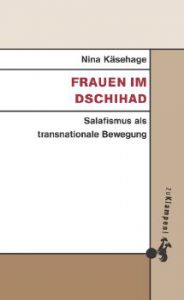
Summer 2024
Even today, the public reception of science is mostly associated with a male researcher (“the” expert). Establishing “the” female researcher as an expert on scientific topics in the public sphere, on the other hand, seems difficult. This perception can be influenced by gender-specific factors (stereotypes, discrimination, etc.), but can also be (unconsciously) supported by the reticence and passivity of female scientists themselves. This publication uses qualitative data to examine how female researchers from a wide range of disciplines reflect on their own role, present it publicly and how they disseminate their research findings. Finally, structural and methodological recommendations are formulated that can help to make female scientific expertise (more) visible.
July 2024
Keeping Peace in Troubled Times – Perspectives from Different Disciplines on War and Peace
This interdisciplinary anthology offers both theoretical reflections and empirical data on past, present and possible future war and crisis situations. In addition, against the background of the authors’ academic and practical experience in the field of international political observation and consultancy, proposals are formulated for peacekeeping in crisis regions and with regard to extreme environments. Furthermore it addresses sensory and aesthetic perceptions of war and peace. Unlike other books on the subject, this contributed volume seeks solutions for lasting peace from various fields that could help improve quality of life for people around the world – especially in heterogeneous societies, which are often shaken by religious, ethnic or political crises.
November 2023
The habilitation thesis by extremism expert Nina Käsehage offers a multidimensional perspective on German children and adolescents who grew up with jihadist mothers and, in the course of the emergence of the Islamic State (IS), left with them for Syria, where they were henceforth socialized by the IS. This thesis provides a qualitative longitudinal study with the three groups interviewed, focusing on the consideration of a possible change in their religious, social, and political values in three time periods: with the IS, returned, and after a year of ‘reintegration’ into German society. This methodological approach opens up previously unknown inner views into the developmental trajectories of both the mothers and the young interviewees in the adolescent phase. These were dubbed “Young Sahaba” by the IS – in reference to the companions of the Islamic prophet Muhammad. In addition, the focus on gender-sensitive issues is sharpened by questioning not only the role of women in the IS and their motivations for leaving to join a terrorist militia, but also the social reception of a ‘mother’ who takes her children on a journey into the unknown. Further aspects concerning the adequate social and (religious) pedagogical treatment of returnees and their children as well as their legal evaluation round off the overall view of the so far no (young) jihadists in Germany, are also considered in particular against the background of the risk to children’s well-being and possible protective measures for children of ideologized parents.
Review related to “The Young Sahaba” in “Die Welt des Islam” – International Journal for the Study of Islam by PD Dr. Isabella Schwaderer February 3, 2025
March 2021
Religious Fundamentalism in the Age of Pandemic
- The multidisciplinary anthology Religious Fundamentalism in the Age of Pandemic provides deep insights concerning the current impact of Covid-19 on various religious groups and believers around the world. Based on contributions of well-known scholars in the field of Religious Fundamentalism, the contributors offer about a window into the origins of religious fundamentalism and the development of these movements as well as the creation of the category itself. Further recommendations regarding specific (fundamentalist) religious groups and actors and their possible development within Buddhism, Christianity, Islam and Judaism round up the discussion about the rise of Religious Fundamentalism in the Age of Pandemic.
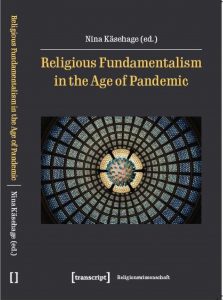
https://www.transcript-verlag.de/978-3-8376-5485-1/religious-fundamentalism-in-the-age-of-pandemic/
Reviews:
Terrorism and Political Violence, Volume 33, 2021, issue 5: Review by Prof. János Besenyo, Óbuda University: ‘Religious Fundamentalism in the Age of Pandemic by Nina Käsehage’: https://www.tandfonline.com/doi/abs/10.1080/09546553.2021.1939534
November 2020
Prevention of Violent Extremism in Western Muslim Diasporas
- At the present time, various forms of violent extremism in the left- and right-wing as well as in the jihadist milieus seem to increase all over the world. This development produces a lot of concerns within Western societies and is often fueled by populist actors in terms of their own purposes. The present book seeks to clarify the real situations and possible threats that are currently occurring with regard to the three considered violent extremist movements in Belgium, Canada, Denmark, France, Germany, Great Britain, The Netherlands and the United States of America (USA).
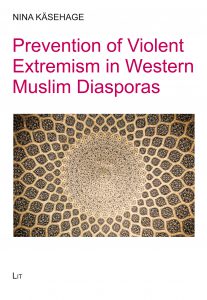
https://www.lit-verlag.de/isbn/978-3-643-91358-6?c=6751
Spring 2020
‘Militant Islam’ vs. ‘Islamic Militancy’? Religion, Violence, Category Formation and Applied Research. Contested Fields in the Discourses of Scholarship (co-ed. with Prof. Dr. Klaus Hock)
- Discourses on ‘radical Islam’, on ‘Islamic extremism’, or on ‘religious violence’ in Islamic contexts are en vogue – in and beyond academia. But in view of the highly contested topic of political Islam, the challenge starts already with the preferred terminology. What actually are we talking about when we talk about ‘salafism’, ‘jihadism’, ‘Islamic terrorism’, etc.?
This edited volume provides a collection of contributions (e.g. Hans G. Kippenberg, Alex P. Schmid and Reinhard Schulze) that due to their respective academic cultures and disciplinary locations display a multifaceted variety of approaches to the research field and its subject.

https://www.lit-verlag.de/publikationen/theologie/73573/militant-islam-vs.-islamic-militancy
Reviews:
Perspectives on Terrorism (PoT), Vol. 14, no. 3, June 2020, Rezension von Prof. Ahmet S. Yayla, DeSales University for Homeland Security: “Book Review: Klaus Hock & Nina Käsehage. ‘Militant’ Islam vs. ‘Islamic Militancy’? Religion, Violence, Category Formation and Applied Research. Contested Fields in the Discourses of Scholarship::
https://www.jstor.org/stable/26918324?seq=1#metadata_info_tab_contents
Spring 2019
Salafismus in Deutschland – Entstehung und Transformation einer radikal-islamischen Bewegung
Preface: Prof. Dr. Dr. Peter Antes
This monography provides deep insights into the historical development of the German Jihadist and Salafist Scene. In addition it contributes information about the case of Abu Waala, the Iraqi representative of Daesh in Germany. Furthermore, it draws a picture of the possible development of the DITB, the largest Muslim (Diaspora) Community in Germany with roots in Turkey.
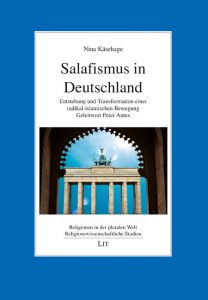
http://www.lit-verlag.de/isbn/3-643-14304-4
Spring 2018
Publication of my dissertation The contemporary Salafi Scene in Germany – Preachers and Adherents. This empirical study is the first basic research about the current Salafi Movement in Germany so far. I conducted 1o5 interviews with considerable Salafi-Preacher and Salafi-Actor in Germany. It shows for instance their social backgrounds, their aims to become adherents of the Salafi Movement and – in parts – their interests of taking part in the so called Jihad in Syria and Iraq. Based on the empiricism of the conducted interviews, this survey gives several de-radicalisation-recommendations and prevention-approaches for the theory and for the practice as well.

- Die gegenwärtige salafistische Szene in Deutschland – Prediger und Anhänger (LIT-Verlag)
- Die gegenwärtige salafistische Szene in Deutschland – Prediger und Anhänger (Amazon)
Selected reviews to the PhD The contemporary Salafist Milieu in Germany. Preachers and Followers:
- REMID (Religious Studies based Media- and Information-Service), Review of Christoph Wagenseil: “Salafism in Germay: Dangerous Sciencet? Review of the work of Nina Käsehage” September 29, 2018: https://www.remid.de/blog/2018/09/salafismus-in-deutschland-gefaehrliche-wissenschaft-rezension-zum-werk-nina-kaesehages/
- Perspectives on Terrorism (PoT), Vol. XXII, issue 5, October 2018, Review of Prof. Alex P. Schmid, Editor-in-Chief PoT: “Book Review: Nina Käsehage. Die gegenwärtige Salafistische Szene in Deutschland. Prediger und Anhänger”: https://www.universiteitleiden.nl/perspectives-on-terrorism/archives/2018#volume-xii-issue-5
Spring 2017
- Publication of my study about Chechen women and their individual motives as well as their influence on young German women:
Dschihad als Ausweg – Warum tschetschenische Frauen in den Krieg ziehen und deutsche Kämpferinnen ihnen folgen:
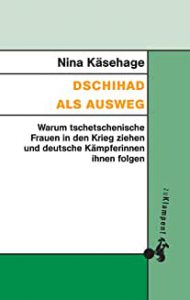
Spring 2016
Publication of my study about Conversion to Islam in Germany with particular regard to constitutional questions, that based upon a sample of 38 interviews with german converts, among them notable German Salafi preacher, and represents the foundation of my current Salafim Research:
